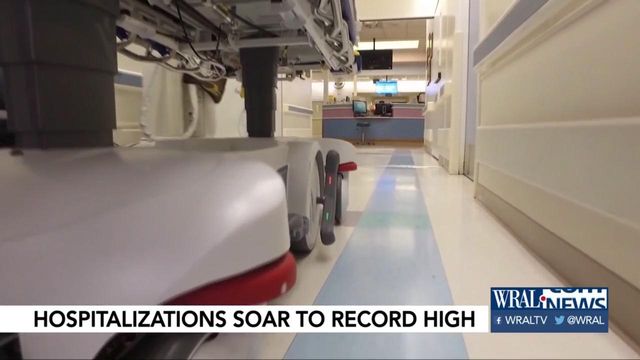Running out of hospital beds, NC hits new high in COVID patients
Hospitals across North Carolina are nearing capacity due to an increase in coronavirus patients.
Posted — UpdatedThe state has topped 3,000 people hospitalized with the virus twice this week, including Wednesday's record of 3,043. Also, a record 696 of those patients were in intensive care on Wednesday.
Seventy-six percent of North Carolina's hospital beds are full, as are 83 percent of ICU beds. The state has averaged a record 2,881 COVID-19 patients per day over the last week.
North Carolina also has averaged a record 6,091 new infections per day over the last week, including 5,609 cases added Wednesday.
Health experts expect coronavirus cases to increase as more people plan to travel for the holidays.
Marleigh Zacek, Harnett Health's chief nursing officer said her biggest concern right now was "hospital bed space and the ability for all of us to continue to take care of all of our patients.”
Both hospitals in Johnston County are at full capacity, health officials said. All 20 ICU beds at Johnston Health are occupied and 14 of those people are on ventilators. Before the pandemic, Johnston Health officials said they normally saw between four and five ICU patients a day and ran at most three ventilators.
Across all UNC Health hospitals, there are more than 400 people being treated for coronavirus, including 75 in the ICU. Those are the highest totals since the pandemic began, Alan Wolf, a spokesperson with UNC Health said.
"Staffing is also a serious concern – we need enough physicians, nurses, respiratory therapists and many others to care for these patients," Wolf said. "It’s putting increasing strain on our workforce, which has been working incredibly hard for many months."
Even if a hospital in Harnett or Johnston county is experiencing capacity issues, they may not have the option to send a patient to a larger facility like UNC Health or Duke Health.
"It’s a little difficult to send patients anywhere else because other hospitals in the region and area are experiencing the same thing as we are," Zacek said.
Keeping the number of coronavirus cases and hospitalizations down in a community is important because hospitals need to be open to patients for life-threatening events, officials say.
Related Topics
• Credits
Copyright 2024 by Capitol Broadcasting Company. All rights reserved. This material may not be published, broadcast, rewritten or redistributed.





